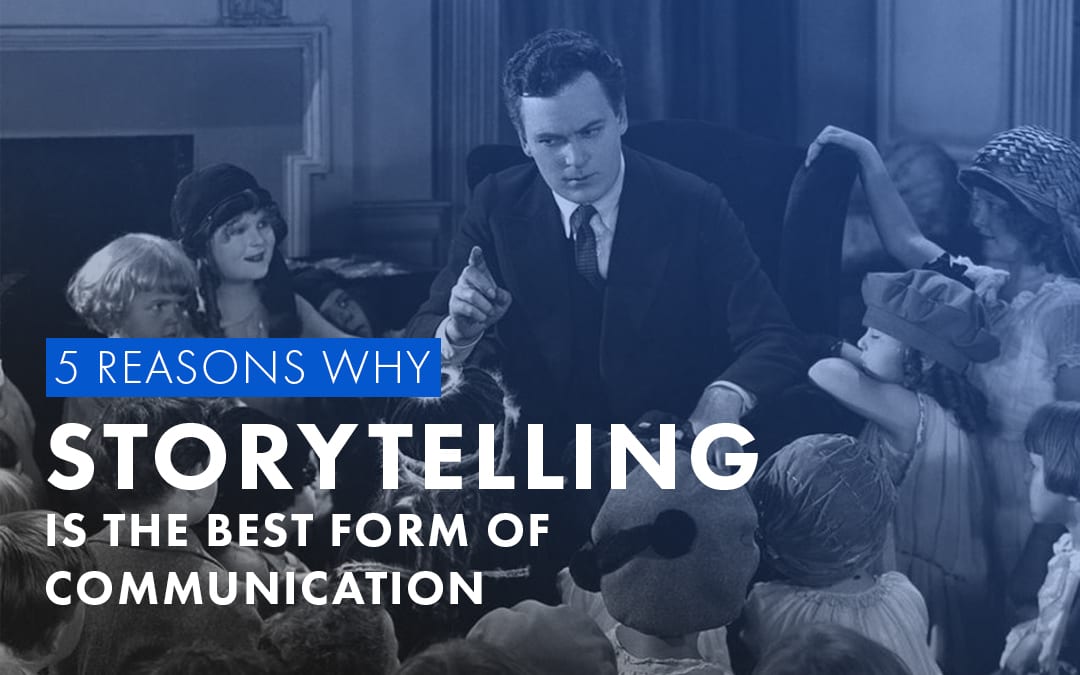Why is storytelling important to companies especially when it comes to communication strategy? Let’s learn the benefits of communicating your message with stories.
We have been telling stories ever since we can remember, then why is it that there is so much attention being given to storytelling from companies since the last few decades?
Storytelling is the art of communication using stories and narratives. It has been derived from the dated practice of traditional stories which have been passed down from old generations to new generations verbally and through writing. They are descriptions of connected events that includes identity, history, individuality and culture.
1. Storytelling Shows Personality
Through storytelling, companies can show that they aren’t indistinctive as the company’s unique personality and culture can be attached to the stories told. [1] As it is crucial for a company to build a culture that reflects the company’s unique vision, values, and goals, using storytelling helps to express the culture and personality. [2]
Consequently, it allows internal and external stakeholders to perceive the company the way it wants to be recognised.
.
2. Storytelling Connects You with Your Audiences
Storytelling evokes highly reliable activity in many brain areas of the listener and activates an event called ‘neural coupling’ which enables one to convert the ideas presented in the story into his/her feelings and experiences and the storyteller would be able to plant ideas, thoughts and emotions into the listener’s brain. [3][4]
Therefore, using storytelling as a communication approach allows the content and message to be delivered in a more personal and relatable way.
John Lewis & Partners has always been using touching stories for their commercials every Christmas and has successfully connected with their audience with the message that every gift they buy from them has a special meaning.
.
3. Storytelling Grants Better Information Retention
As a story structure always consists of character, goal, and challenge. The resolution of the problem is full of tension, turning points, ups and downs, and the final climax.
When one listens to a piece of communication with an emotional rollercoaster, as it happens in the case of a story, the brain releases a chemical that plays a vital role in thinking, motivation and emotions, ‘dopamine’. [5] It stimulates memory and supports the person to remember that piece of communication accurately and for a more extended period. [6]
Other than dopamine, research also suggests that our brains are more likely to focus on stimuli of emotional significance, negative and positive. [7] This is why stories continue are 2 to 10 times more memorable than facts. [8]
.
4. Storytelling Evokes Positive Emotions
We have always been using stories to bring out different emotions in people. There are three main hormones which are released when someone listens to a story. Previously mentioned, one of them is ‘dopamine’, which contributes to feelings of pleasures and satisfaction as part of the reward system. [9] All storytelling is per definition dopamine creating because it’s always something that we’re waiting and expecting.
The next hormone is oxytocin, which makes people feel empathy. By creating empathy, the listeners will have a stronger sense of trust and bond with the characters in the stories and the storyteller. [10]
The third and last hormone is endorphins, which makes people laugh. With laughter, people become more relaxed, and they become more focused.
With these three positive hormones induced, an Angel’s Cocktail is mixed.
By communicating your message with a story that evokes at least one of these emotions, it allows your audience to connect all the positive qualities from the hormones with you and your message.
An example of a simple heartwarming story animated by Gram for the National Library Board.
.
5. Storytelling Encourages Viewers to Take Action
Us, humans are governed by our feelings, where our decisions are mostly emotional, not logical. Especially when most of our choices are made subconsciously. Researchers could predict what decision people would make 7-10 seconds before they were even aware of having made a choice. [11]
This means that when people think they are making a conscious, logical, decision, they probably are unaware that they’ve already made a decision and that it was unconscious.
.
Closing thoughts
Therefore, using a strong narrative to tap into the emotions of your audience is an excellent technique for compelling action.
Overall, you can use storytelling as a powerful communication tool to display the company’s characteristics and values to multiple stakeholders. It also has the power to connect you with your audience, make them remember what you have to say and change their brain chemistry and in turn, their actions.
We hope that these facts help you in including storytelling into your communication strategy. If you ever feel lost or unsure, know that we here at Gram are glad to help.
Did you enjoy reading this article? Read Gram’s article about 5 Reasons Why Video Is More Effective Than Text here.
Sources:
[1] https://inside.6q.io/storytelling-to-communicate-vision/
[2] https://www.liveplan.com/blog/an-organizations-culture-is-as-individual-as-you-are/
[3] https://www.pnas.org/content/107/32/14425
[4] http://www.narrativeiq.com/what-stories-do-to-our-brain/
[5] https://medicalxpress.com/news/2018-05-dopamine-neurons-contribute-memory-formation.html
[6] https://www.quantamagazine.org/to-remember-the-brain-must-actively-forget-20180724/
[7] https://www.psychologistworld.com/emotion/emotion-memory-psychology
[9] https://www.psychologytoday.com/us/basics/dopamine
[10] https://singjupost.com/david-jp-phillips-magical-science-storytelling-transcript/?singlepage=1
[11] https://www.smashingmagazine.com/2019/02/human-decision-making/



